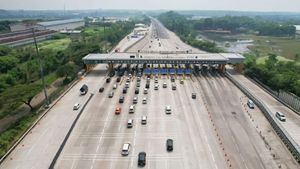YOGYAKARTA Eating protein food aims to build muscles. Besides also helping to lose weight because it replaces calories with protein foods, it is also certain risks if you eat mostly protein foods. So it is important to recognize the following signs of too much daily protein intake that you consume.
According to Nashville-based personal trainers and nutritionists, Dan DeFigio, research supports protein intake of between 0.8 grams per kilogram of body weight. That is, if you weigh 70 kilograms, you can consume 56 grams of protein per day. Along with this information, hydration is very important when you increase protein consumption. Dehydration is a sign that body fluid levels are decreasing. This is a sign that fluid is absorbed to remove nitrogen in order to process protein. So, if you drink as usual but your body is dehydrated, it is the first sign that you eat excess protein food.
Glucose is the brain's main source of fuel. If protein intake increases to replace carbohydrates, the brain may not get the fuel it needs to function properly. Usually, it is characterized by a foggy brain when your protein intake is mostly. Obviously, DeFigio, if you experience excess protein in the long term, ammonia in the bloodstream will accumulate. Although it won't be a problem for health, it will disrupt your cognitive activity.
Eating a lot of protein intake causes you to get fatter. This can also affect metabolic diseases. But eating high protein after exercising is good. Avoid adding cheese burgers, potatoes, or nacho so that weight doesn't rise.
When you increase protein intake, you often reduce carbohydrate or fat consumption. So this will affect the intensity and performance of the exercise or workout. But scientists say daily protein intake is higher than carbohydrates significantly can reduce total energy intake.
The suggestion is for even daily consumption between meal times and snacks. Add carbohydrates to increase energy and healthy fat in moderate quantities.
If defecating is difficult, eating patterns play a major role. According to DeFigio, a high or low-carb protein diet, often low in fiber. This will make you experience constipation. Tips from the protestional reported by Muscle and Fitness, Thursday, September 7, increase fluid intake and grain consumption when the first symptoms of constipation appear. This may mean you need to stop while consuming protein until the symptoms subside.
Low-carb diets, generally higher protein and possibly cause mouth odors. A study of the effectiveness and safety of low-carb diets in teens notes that far-flavour, mouth odor, and dry mouth are often referred to as side effects of high-protein diets.
A high protein diet has the potential to increase the risk of calcium rock formation in the urinary tract. Simple dehydration and excess calcium urine lead to kidney stones. To maintain acid-base balance and prevent kidney stone formation, scientists say that people who undergo a high protein diet should eat fruits and potassium high vegetables.
SEE ALSO:
Those are the seven signs of eating too much protein food. The above signs need to be recognized to prevent the risk of worsening your daily health and performance.
The English, Chinese, Japanese, Arabic, and French versions are automatically generated by the AI. So there may still be inaccuracies in translating, please always see Indonesian as our main language. (system supported by DigitalSiber.id)


















